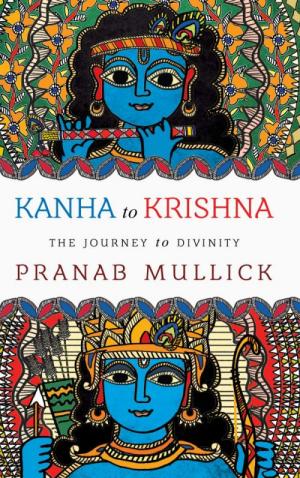I recently finished reading ‘KANHA to KRISHNA: The Journey To Divinity’ authored by Pranab Mullick. When I bought the book at Odyssey, I thought it was just a retelling of the same tales of young Krishna I’d been hearing for years. So I had thought it’d be fun to read them all as a novel again.
 But the book turned out to be something more than a mere retelling. In the prologue, author Pranab Mullick mentions that he believes when God takes a human avatar, he has to go through all the pains, emotions, and situations which all humans have to go through. This theme was applied throughout the book. But I had heard things differently: I had thought the Rama avatar was one such avatar like the author mentioned, and the Krishna Avatar was one in which Krishna knew his divinity, and had supernatural powers.
But the book turned out to be something more than a mere retelling. In the prologue, author Pranab Mullick mentions that he believes when God takes a human avatar, he has to go through all the pains, emotions, and situations which all humans have to go through. This theme was applied throughout the book. But I had heard things differently: I had thought the Rama avatar was one such avatar like the author mentioned, and the Krishna Avatar was one in which Krishna knew his divinity, and had supernatural powers.
In Pranab Mullick’s book, Kanha (which is Krishna’s name in Gokul) is a very normal boy. He is loved so much by his parents Yashoda and Nandrai, that they value him more than their lives. No one even has a hint that this dark boy is actually the eighth son of Devaki, who was smuggled out of the Mathura prison on the night of his birth.
The book also has lots of interesting aspects from different perspectives. First there is the scene of Yashoda’s delivery, from Nandrai’s point of view. Then there is the narration of all the main events of his life from Vasudeva’s point of view. Then there is this clever and cunning minister of Kansa, Chanur’s point of view. Chanur was from a tribal settlement, whose homeland was destroyed by the Yadavas building their city Mathura. His life ambition is to take revenge, lead Kansa into doing the wrong things, and re-establish his tribal land. He is very much similar to the cunning Shakuni.
The book explains to us the intensity of Kansa’s cruelty, the influence on him by cunning Chanur, and the pathetic situation of Vasudeva and Devaki. The author has included a lot of political conversations, which make so much sense, that I was surprised on reading them. I never knew all these events in our mythology might have had such secret conversations behind them. The author has made it all look so real.
The only thing in which I was disappointed by this book, was the lack of ‘Krishna’ in it. When we read the title ‘Kanha to Krishna’, most of us would imagine a full and full life-story of Krishna. But sadly, it’s not. The novel appears to be more of Kansa, Vasudeva, and Chanur, rather than Krishna. I’m not telling there is no Krishna-perspective here, but it was less when compared to the vast chapters of Chanur, Kansa and Vasudeva.
Krishna’s babyhood, childhood and teenage were all filled with lots of events. But only a few are portrayed here. And as the author had mentioned earlier, young Krishna does not have any special powers. He does not carry the Govardhan Mountain on his little finger, but leads all the villagers into a huge cave during the rains for shelter. He does not kill Kaliya inside the river, and later dance on its head, but rather smashes it into a pulp with a stick and is exhausted for days. There is no Rasa-Leela, or no magical events which portray Krishna as someone not so normal. Maybe that is why the author has lessened the number of feats by Krishna.
But I liked the bond between Radha and Krishna. It was very well explained and it actually makes us believe that “this was how it happened that time.”
Then are the explanation of celebrations in the city. It makes it all look so delicious to take in. The author’s writing is so perfect throughout the book. But the most interesting part is the climax, which ought to be in all good books.
Akrur and Guru Sandipani find out that Krishna is the eighth son of Devaki and the avatar of Vishnu, as predicted by a sadhu. Interestingly, Chanur is also directly involved in all the events without his own knowledge. In the end, he also aims to kill Kansa, so that he can overpower him. Krishna is told his own story by Guru Sandipani and is introduced to his brother Balarama. Krishna refuses to believe Yashoda is not his real mother, and broods on it for days, until he takes it in. With the help of his guru and Akrur, they raise a small group of boys of his age, called the Narayani Sena, who aim to kill Kansa. They make plans and it goes on very smoothly. I am not revealing anymore here, since it is so good to read it as a suspense.
Overall, the whole book is an excellent retelling of the Krishna Avatar until the main events of the Mahabharata. It has sufficient dollops of politics, strategies, cruelty, suffering, revenge, self-realisation, leadership, and romance. It is a must read for all those who think a unique retelling of Krishna’s life would do good!
Nice Review …
Good
Thank U
Nice review…Jy Shri Krishna..👌💝🙏🏾